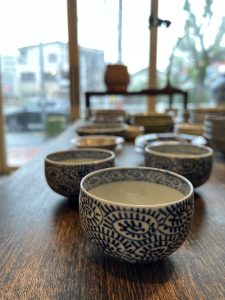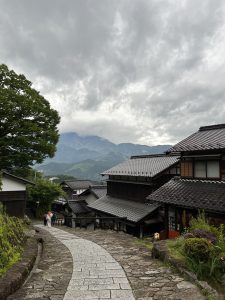本日も五月雨式に失礼いたします。(愛知県名古屋市千種区 骨董買取 古美術風光舎)
2023.05.19
みなさまこんにちは、スタッフYでございます。
先日から引き続き、私スタッフYが五月雨式にブログをお届けいたします。
本日はここ名古屋は朝から雨が降ってきまして、時折激しい雨脚だったのですが、今は少し落ち着いた雨に変わってきました。これは「五月雨」なのか?と、ふと疑問に思いまして、少し調べてみましたら、やはり旧暦の季語、少し季節の誤差があるようですね。

本来、「五月雨(さみだれ)」とは「5月の雨」ではなく、「梅雨の雨」を指しまして、俳句などではやはり夏の季語として扱われるようです。
辞書の記述を確認しましても、「五月雨」の意味は、
1 陰暦5月ごろに降りつづく長雨。梅雨。つゆ。さつきあめ。《季 夏》
2 断続的にいつまでもだらだらと続くことのたとえ。
(出典:デジタル大辞泉(小学館))
と、なっておりまして、「五月雨」夏の季語ですので俳句では5月の句の中で使うのは予想通り適当ではないようです。旧暦で皐月と呼ばれていた時期は、現在で言う6月上旬~7月上旬のちょうど梅雨にあたりますので、五月雨とは梅雨のころに使うのが本来のようでして、梅雨時期に使われる雨の季語も大変多いのでこれまた混乱しそうではあります。スタッフY、いつまでたっても季語が上手につかえませんね…。
そしてその読み方ですが、その皐月の「さ」と、「水垂れ(みだれ)」を組み合わせて「さみだれ」と発音し、「五月雨」という文字をあてたようですが、なんせ梅雨時期に降る雨のことを指しますので、まあその時期にダラダラと続く様子を表すようになりました。
ところで、「五月雨」を季語にした俳句に、松尾芭蕉のあの有名な句がございますが、あの句にはちょっと面白い話があるようです。
有名な芭蕉の句、
「五月雨を あつめて早し 最上川」
意味は、「五月雨を集めてきたように水が流れている、この最上川の豪快なことよ」ということでありますが、芭蕉は、はじめこの句を下のように詠んだそうです。
「五月雨を あつめて涼し 最上川」
こちら意味は「五月雨を集めてきたように、最上川の涼しく風流なことよ」であります。元々の句の方が「季語=五月雨=夏」という雰囲気に合っているかなという気もしますが、推敲の結果、今は有名になっている上の形にしたと伝えられております。
それにはこぼれ話がございまして、芭蕉は、最上川のそばの集落で行われた句会で一旦は下の形の句を詠みますが、その後、最上川を下る舟に乗せてもらってビックリしたそうです。「“涼し”じゃないぞ…。」と。最上川、水量も水の速さもすごく豪快に流れているではありませんか。
「そうか、最上川とはこういう川だったんだな」と思い直し、元々の風流な雰囲気の漂う「涼し」から現在よく知られている「早し」に詠み直してしまったそうですから、体感とはいかに大事か、ですよね。よほど最上川の水勢が強烈な印象だったんでしょう。
やはり、たった一つの言葉を一つ入れ替えるだけでこんなに雰囲気の違う句にしてしまうあたりはさすが大天才だけありますが、そんな天才においても体感せねば本来の句は詠めないようですね。よって、凡人は尚のこと何事も体感せねばならないのだなと思った次第でございます。

というわけで、本日は五月雨(ではない)を写真におさめておきましょう…。また、先日立ち寄りました中山道宿場町馬籠の五月雨があがった様子もよろしかったらご覧ください。



それでは、ごきげんよう。
Hello everyone, this is Staff Y.
Continuing from the other day, I, Staff Y, would like to bring you a blog in the manner of May rain.
It has been raining since this morning. The rain was heavy at times, but it has now changed to a calmer rain. Is this “May rain”? I wondered, so I did a little research and found out that it is a seasonal term in the lunar calendar, and there seems to be a little seasonal error in the term.
Originally, “Samidare” does not mean “May rain” but “rainy season rain,” and in haiku, it seems to be treated as a summer season word.
According to the dictionary, the meaning of “May rain” is as follows
1 A long rain that continues to fall in the fifth month of the lunar calendar. A rainy season. 2. the rainy season. Satsuki rain. The season of summer.
2 A metaphor for an intermittent, uninterrupted, and unremitting rainfall.
(Source: Digital Daijisen (Shogakukan))
Satsuki rain” is a summer season word, so as expected, it is not appropriate to use it in haiku in May. The period called satsuki in the old calendar corresponds to the rainy season from early June to early July in the current calendar, so the term “May rain” should be used around the time of the rainy season. There are many seasonal words for rain used during the rainy season, so it seems confusing….
The reading of the word “satsuki rain” is a combination of “satsuki no sa” and “midare,” which is pronounced “samidare,” and the character “maysuki rain” was applied to the word.
By the way, there is a famous haiku by Matsuo Basho that uses “May rain” as a seasonal term.
The famous haiku by Matsuo Basho is called “May rain,
The meaning of this haiku is, “May rain is collected and the river is fast.
The meaning of the phrase is, “The Mogami River is flowing like it has collected the May rain,” but Basho is said to have composed this phrase as follows
Basho first composed this haiku as follows: “The Mogami River is cool as it collects the May rain.
The meaning of this phrase is “The Mogami River is cool and breezy as if it were collecting the May rain. It is said that Basho’s original poem was better suited to the atmosphere of “season word = May rain = summer,” but after much polishing, he decided to use the above form, which is now famous.
Basho once composed a haiku in the lower form at a haiku gathering held in a village near the Mogami River, but he was surprised when he was taken on a boat going down the river. It’s not cool…” He was surprised when he was taken on a boat going down the Mogami River. The Mogami River is flowing very fast and the volume of the water is very dynamic.
He recalled that the Mogami River was such a river, and changed his poem from “cool” to “fast,” which is well-known nowadays. The water flow of the Mogami River must have made a strong impression on the poet.
As one would expect from a great genius, he was able to create a phrase with such a different atmosphere just by replacing one word in the poem. Therefore, I think that ordinary people need to experience everything even more.
Anyway, let me take a picture of today’s May rain (not).
Have a good day.
********************
ご実家の整理やお片付けなどをされている方のご相談などが多くございます。
お片付けなどくれぐれもご無理のないようになさってくださいませ。
風光舎では古美術品や骨董品の他にも絵画や宝石、趣味のお品など様々なジャンルのものを買受しております。
お片付けをされていて、こういうものでもいいのかしらと迷われているものでも、どうぞお気軽にご相談下さいませ。
また風光舎は、出張買取も強化しております。ご近所はもちろん、愛知県内、岐阜県、三重県その他の県へも出張いたします。
まずは、お電話お待ちしております。
愛知県名古屋市千種区姫池通
骨董 買取【古美術 風光舎 名古屋店】
TEL052(734)8444
10:00-17:00 OPEN
#出張買取#骨董#古美術#生前整理#家じまい#刀剣#掛軸#茶道具

